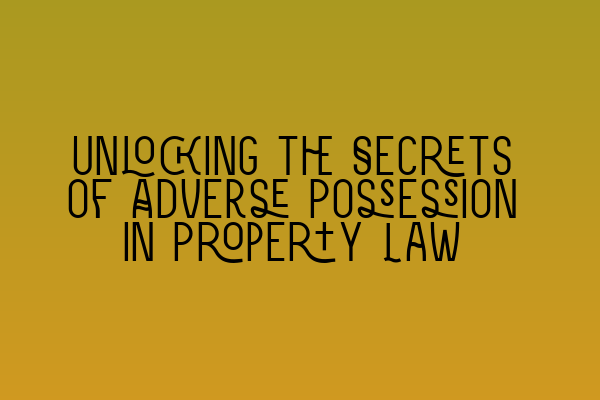Unlocking the Secrets of Adverse Possession in Property Law
Welcome to SQE Property Law & Land Law, where we specialize in providing expert legal advice on a wide range of property law matters. Today, we will delve into the intriguing world of adverse possession and explore the secrets behind this fascinating legal concept.
What is Adverse Possession?
Adverse possession is a legal principle that allows someone who is not the legal owner of a piece of land to become the rightful owner through continuous and exclusive possession of the land for a specified period of time. In simple terms, it means that if you occupy a piece of land without permission from the legal owner and meet certain criteria, you can eventually claim ownership of that land.
Requirements for Adverse Possession
To successfully claim adverse possession, certain requirements must be met. These requirements vary depending on the jurisdiction, but generally include the following elements:
1. Actual Possession: The claimant must physically occupy the land and treat it as their own. This can include activities such as erecting fences, cultivating the land, or constructing buildings.
2. Exclusive Possession: The claimant must have exclusive possession of the land, meaning that they have full control and enjoyment of the property, excluding the rights of the legal owner and any other third parties.
3. Open and Notorious Possession: The claimant’s possession must be open and obvious to the public and the legal owner. This means that the claimant cannot hide their occupation of the land; it must be done in a manner that can be easily observed.
4. Hostile Possession: The claimant’s possession must be adverse to the legal owner’s rights. In other words, they must possess the land without permission or consent from the legal owner.
5. Continuous Possession: The claimant must occupy the land continuously for a specified period of time, which can range from a few years to several decades, depending on the jurisdiction. Any gaps in possession can jeopardize the claim.
Proving Adverse Possession
To successfully claim adverse possession, the claimant must provide evidence to support their claim. This can include documents such as photographs, witness statements, utility bills, and any other evidence that demonstrates their continuous and exclusive possession of the land.
It is important to note that adverse possession laws can be complex and vary from jurisdiction to jurisdiction. Therefore, it is advisable to seek legal advice from a qualified property law solicitor to guide you through the process.
Why Is Adverse Possession Important?
Adverse possession can have significant implications for property owners and prospective buyers. Understanding the rules and principles of adverse possession is crucial when dealing with property boundaries, encroachments, and disputes between neighbors.
For property owners, adverse possession claims can result in the loss of land if they fail to take action within the prescribed timeframe. On the other hand, for individuals seeking to acquire land, adverse possession can offer a unique opportunity to gain ownership of a piece of land that has been neglected or abandoned.
It is also worth mentioning that adverse possession laws aim to strike a balance between the interests of the current occupant and the legal owner of the land. The legal system recognizes that long-term possession can create equitable rights for the occupant, but it also seeks to protect the rights of the legal owner.
Seeking Professional Advice
If you find yourself involved in a potential adverse possession matter, it is essential to consult with a solicitor who specializes in property law. Our experienced team at SQE Property Law & Land Law can provide you with expert advice and guidance, ensuring that you fully understand your rights and obligations in relation to adverse possession.
To further enhance your knowledge and prepare for the SQE exams, we recommend exploring some of our related articles:
– SQE 1 Practice Exam Questions: Test your knowledge with our collection of practice exam questions.
– SQE 1 Practice Mocks FLK1 FLK2: Familiarize yourself with the format and content of the SQE 1 exams.
– SQE 2 Preparation Courses: Prepare for the next stage of the SQE exams with our comprehensive preparation courses.
– SQE 1 Preparation Courses: Enhance your understanding and knowledge with our tailored preparation courses for SQE 1.
– SRA SQE Exam Dates: Stay updated with the latest exam dates and deadlines set by the Solicitors Regulation Authority.
Final Thoughts
Adverse possession is a multifaceted legal concept that requires careful consideration and understanding. By unlocking the secrets of adverse possession, you can navigate this complex area of property law with confidence.
Remember, when dealing with adverse possession matters, it is always advisable to seek legal advice from a qualified solicitor who specializes in property law. At SQE Property Law & Land Law, our dedicated team is here to assist you every step of the way.
Disclaimer: This blog post is for informational purposes only and does not constitute legal advice. Please consult with a qualified solicitor to obtain professional advice tailored to your specific circumstances.
